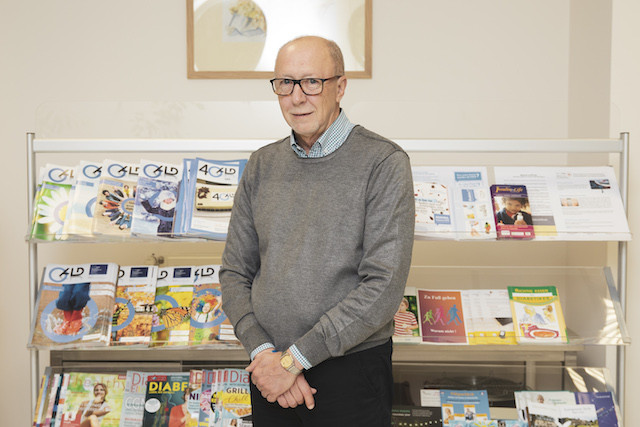When Roger Behrend was diagnosed with type 2 diabetes about 35 years ago, it played a significant role in how he thought about his health for reasons that weren’t immediately apparent.
“The fact that I have diabetes has helped me a lot with my health because I take more care of the foods that I eat and the things that I do,” he says.
To get to such a point, however, took some adjustment. Behrend was taking medication for a decade after his diagnosis but found he was having trouble controlling his sugar levels. Eventually, his pancreas stopped producing insulin, so he had to switch from pills to injections. Although many struggle with shots, Behrend says a pill diet forces people to be even more careful with what they consume. “The insulin gives you a bit more freedom. That’s my personal opinion.”
Having dealt with the illness for so long, Behrend knows how his body reacts to certain foods. For example, while he can tolerate noodles, he has trouble eating pizza which requires him to take “8-9 units of insulin, so I don’t bother with it anymore”. For over 20 years, Behrend has been a member of the Association Luxembourgeois du Diabète (ALD, or Luxembourg Diabetes Association), through which he was able to get advice and take courses on diabetes. This year, in which the ALD turns 40, he became president of the association.
Among its other activities, the ALD manages the Maison du Diabète, where diabetics and their families can get advice on diets, testing, injections, and more. According to Sylvie Paquet, managing director of the Maison du Diabète, there are an estimated 26,000 diabetics residing in Luxembourg, around 8-10% of which have type 1 diabetes. She says that at the time the centre was founded in 2003, it helped fill a gap, since there hadn’t been any specialised services in the hospitals. These days, she says, there’s a roughly 50-50 split of people who were sent by their doctors compared to those who visit on their own initiative.
While Behrend has found a way to cope with his own diabetes, he says it’s extremely difficult for children. “I think children have a much more difficult process of coming to terms [in part] because of peer pressure.” Parquet adds that everyone handles diagnosis differently, but in the case of children, “it’s good when the parents can meet each other”, which is something the centre can help facilitate.
World Diabetes Day falls on 14 November each year, so it’s no surprise that the association holds a number of walks and conferences around the occasion. On the evening of the day itself, for example, the Centre Hospitalier de Luxembourg will host a conference focused on the seven points to better understand, prevent and treat diabetes.
The team hopes diabetics will establish good habits early, as complications from diabetes can be severe, ranging from blood clots and nerve damage to increased chance of infection. “It’s a day-to-day sickness that you have to live with day to day,” Behrend says. “All the bad things that can happen to you, like problems with your eyes, kidneys, nerves, don’t show up until 20-30 years afterwards, but once they’re there, they’re there. As soon as you get a good structured daily life, as much as possible, the better.”
